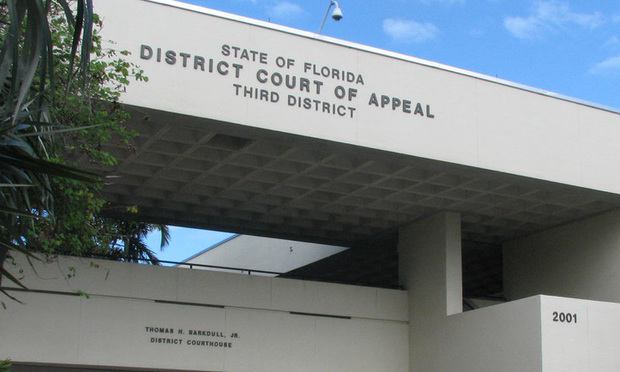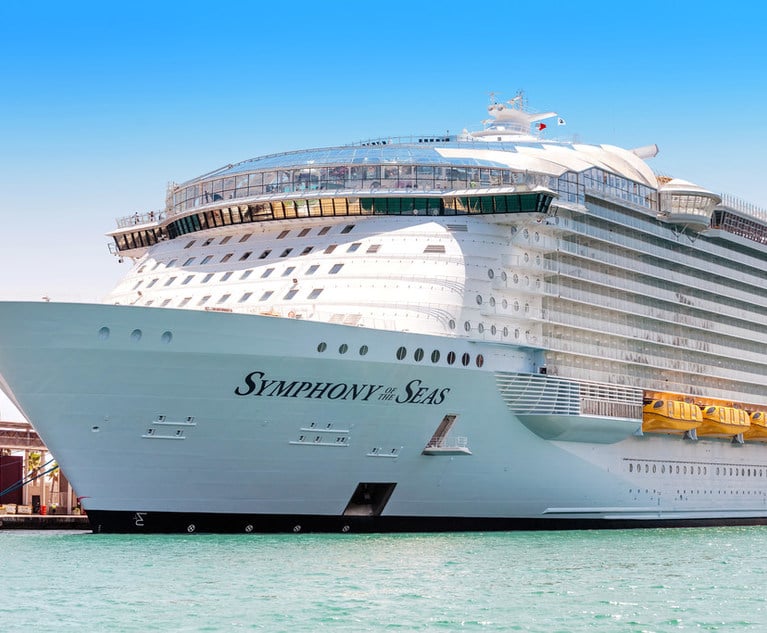Appellate Court Rules in Favor of MetroPCS in Arbitration Clause Conflict
The T-Mobile-owned wireless carrier's move for arbitration against a longtime customer will proceed following a favorable ruling from Florida's Third District Court of Appeal.
December 27, 2018 at 06:18 PM
3 minute read
 Third District Court of Appeal at 2001 SW 117th Ave., in Miami. Photo: J. Albert Diaz/ALM
Third District Court of Appeal at 2001 SW 117th Ave., in Miami. Photo: J. Albert Diaz/ALM
The Third District Court of Appeal has ruled in favor of a major phone company in a dispute concerning an arbitration clause and a putative class action lawsuit.
The appellate court issued an opinion Wednesday reversing and remanding a January 2017 order by Miami-Dade Circuit Judge Jorge Cueto, who denied MetroPCS' motion for arbitration against disgruntled customer Jorge Porter. The appeals court found that Porter had agreed to resolve any prospective conflicts with his wireless service provider through arbitration when he consented to the terms and conditions of service.
The appellate court found three different notice methods germane to Porter's interaction with MetroPCS: the written documents at sale, prelitigation text messages, and text messages sent after the start of the lawsuit. In contrast to the trial court, the Third DCA held that payment reminder text messages that MetroPCS sent Porter both before and after he filed suit against the company sufficiently put him on notice about the contract's arbitration provision.
Read the ruling:
The appellate court singled out text messages from MetroPCS containing a hyperlink to the terms and conditions of service as an easily accessible and direct means of making Porter aware of the arbitration provision in the contract.
“Porter understood that the phrase 'Terms & Conditions' was a link through which he could access information of MetroPCS' terms and conditions on his phone. However, Porter never accessed the information because he believed he 'had no reason to go there,' ” the court wrote. “ Porter simply chose not to click on the hyperlink.”
The Third DCA's ruling allows for MetroPCS' motion for arbitration against Porter to proceed.
The litigation between the two parties began in May 2012 when Porter filed a putative class action complaint against his longtime phone service provider. The lawsuit alleged the company had violated Florida's Deceptive and Unfair Trade Practices Act by charging him as well as other MetroPCS users sales tax on the full price of cellphones that had been purchased using a rebate.
MetroPCS subsequently countered Porter's putative class action by submitting a motion to compel arbitration of his claim in June 2012.
Porter's lawyer, Coral Gables attorney Gonzalo Dorta, did not respond to requests for comment by press time. The attorneys who argued on behalf of MetroPCS — San Francisco-based counsel Michael J. Stortz and Carlton Fields Jorden Burt lawyers Aaron S. Weiss and Steven M. Blickensderfer — also did not reply by deadline.
A representative for T-Mobile, which merged with MetroPCS in 2013, declined to comment citing company policy of not speaking on pending litigation.
Related stories:
This content has been archived. It is available through our partners, LexisNexis® and Bloomberg Law.
To view this content, please continue to their sites.
Not a Lexis Subscriber?
Subscribe Now
Not a Bloomberg Law Subscriber?
Subscribe Now
NOT FOR REPRINT
© 2025 ALM Global, LLC, All Rights Reserved. Request academic re-use from www.copyright.com. All other uses, submit a request to [email protected]. For more information visit Asset & Logo Licensing.
You Might Like
View All
Trending Issues in Florida Construction Law That Attorneys Need to Be Aware Of
6 minute read
A Voyeur Videotaped Them Undressing. Should Cruise Ship Passengers Have to Arbitrate?
3 minute read
Art of the Settlement: Trump Attorney Reveals Strategy in ABC Lawsuit

Trying to Reason With Hurricane Season: Mediating First Party Property Insurance Claims
Trending Stories
- 1The Week in Data Feb. 3: A Look at Legal Industry Trends by the Numbers
- 2Mass Tort Cases: Challenges for Plaintiff’s and Defense Counsel
- 3Litigator of the Week Runners-Up and Shout-Outs: Davis Wright Tremaine, Wilmer and More
- 4Forum Clause Axes $844M Case Against Reinsurer Over Deadly Plane Crash, Judge Rules
- 5Latham Adds Former Treasury Department Lawyer for Cross-Border Deal Guidance
Who Got The Work
J. Brugh Lower of Gibbons has entered an appearance for industrial equipment supplier Devco Corporation in a pending trademark infringement lawsuit. The suit, accusing the defendant of selling knock-off Graco products, was filed Dec. 18 in New Jersey District Court by Rivkin Radler on behalf of Graco Inc. and Graco Minnesota. The case, assigned to U.S. District Judge Zahid N. Quraishi, is 3:24-cv-11294, Graco Inc. et al v. Devco Corporation.
Who Got The Work
Rebecca Maller-Stein and Kent A. Yalowitz of Arnold & Porter Kaye Scholer have entered their appearances for Hanaco Venture Capital and its executives, Lior Prosor and David Frankel, in a pending securities lawsuit. The action, filed on Dec. 24 in New York Southern District Court by Zell, Aron & Co. on behalf of Goldeneye Advisors, accuses the defendants of negligently and fraudulently managing the plaintiff's $1 million investment. The case, assigned to U.S. District Judge Vernon S. Broderick, is 1:24-cv-09918, Goldeneye Advisors, LLC v. Hanaco Venture Capital, Ltd. et al.
Who Got The Work
Attorneys from A&O Shearman has stepped in as defense counsel for Toronto-Dominion Bank and other defendants in a pending securities class action. The suit, filed Dec. 11 in New York Southern District Court by Bleichmar Fonti & Auld, accuses the defendants of concealing the bank's 'pervasive' deficiencies in regards to its compliance with the Bank Secrecy Act and the quality of its anti-money laundering controls. The case, assigned to U.S. District Judge Arun Subramanian, is 1:24-cv-09445, Gonzalez v. The Toronto-Dominion Bank et al.
Who Got The Work
Crown Castle International, a Pennsylvania company providing shared communications infrastructure, has turned to Luke D. Wolf of Gordon Rees Scully Mansukhani to fend off a pending breach-of-contract lawsuit. The court action, filed Nov. 25 in Michigan Eastern District Court by Hooper Hathaway PC on behalf of The Town Residences LLC, accuses Crown Castle of failing to transfer approximately $30,000 in utility payments from T-Mobile in breach of a roof-top lease and assignment agreement. The case, assigned to U.S. District Judge Susan K. Declercq, is 2:24-cv-13131, The Town Residences LLC v. T-Mobile US, Inc. et al.
Who Got The Work
Wilfred P. Coronato and Daniel M. Schwartz of McCarter & English have stepped in as defense counsel to Electrolux Home Products Inc. in a pending product liability lawsuit. The court action, filed Nov. 26 in New York Eastern District Court by Poulos Lopiccolo PC and Nagel Rice LLP on behalf of David Stern, alleges that the defendant's refrigerators’ drawers and shelving repeatedly break and fall apart within months after purchase. The case, assigned to U.S. District Judge Joan M. Azrack, is 2:24-cv-08204, Stern v. Electrolux Home Products, Inc.
Featured Firms
Law Offices of Gary Martin Hays & Associates, P.C.
(470) 294-1674
Law Offices of Mark E. Salomone
(857) 444-6468
Smith & Hassler
(713) 739-1250






